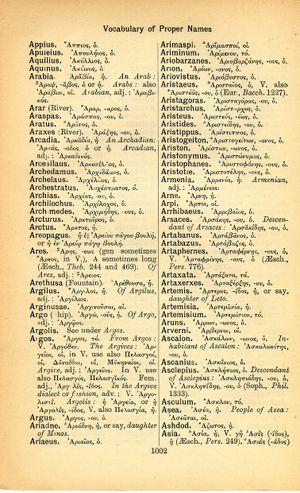Argos
English > Greek (Woodhouse)
Ἄργος, τό.
From Argos.: V. Ἀργόθεν.
The Argives: Ἀργεῖοι, οἱ, in V. use also Πελασγοί, οἱ. Δαναίδαι, οἱ, Μυκηναῖοι, οἱ.
Argive, adj.: Ἀργεῖος.
In V. use also Πελασγός, Πελασγικός. Fem. adj., Ἀργολίς, -ίδος.
In the Argive dialect or fashion, adv.: V. Ἀργολιστί.
Argolic: ἡ Ἀργεία, or ἡ Ἀργολίς, -ίδος, V. also Πελασγία, ἡ.
Latin > English (Lewis & Short)
Argŏs: n. (only nom. and acc.), more freq. in the plur. Argi, ōrum, m. (Varr. L. L. 9, § 89 Müll.: Graecanice hoc Argos, cum Latine Argei; cf. Prob. p. 1447 P.; Phocae Ars, p. 1707 P.), = Ἄργος.
Argos, the capital of Argolis, in the Peloponnesus, sacred to Juno, also called Argos Hippium and Argos Dipsium or Inachium, Plin. 4, 5, 9; 7, 56, 57; cf. Mann. Gr. p. 641 sq.: quaerit Argos Amymonen, Ov. M. 2, 240; so id. ib. 6, 414; Hor. C. 1, 7, 9: securum per Argos, Ov. H. 14, 34; so Luc. 10, 60: patriis ab Argis Pellor, Ov. M. 14, 476; 15, 164; Verg. A. 7, 286; Hor. S. 2, 3, 132; id. Ep. 2, 2, 128; id. A. P. 118; Liv. 34, 25 et saep.—The acc. Argos, occurring in the histt., is best considered as plur., since the sing. seems rather to belong to the poets and geographers (e. g. Plin. above cited); cf. Daehne and Bremi ad Nep. Them. 8, 1.—
B Poet., Argos is sometimes put for the whole of Greece, Luc. 10, 60.—Hence,
II Derivv., the adjj.,
Argīvus, a, um (i. e. ArgiFus from ArgeiFos, like Achivus from Ἀχαιός), of Argos, Argive, Plaut. Am. 1, 1, 53: Argivus orator, Cic. Brut. 13, 50: augur, i.e. Amphiaraus, Hor. C. 3, 16, 12 —An epithet of Juno (as in the Iliad Ἀργεία is an appel. of Here) as tutelary goddess of Argos, Verg. A. 3, 547.—
2 Poet. for Greek or Grecian in gen.: castra, Verg. A. 11, 243: phalanx, id. ib. 2, 254: ensis, id. ib. 2, 393: Thalia, Hor. C. 4, 6, 25 (cf. id. ib. 2, 16, 38: Graja Camena).—And so Argivi for the Greeks: classis Argivūm, Verg. A. 1, 40; 5, 672; Hor. C. 3, 3, 67; Val. Max. 5, 1, ext. 4.—
B Without digamma, Argēus (Argī-), a, um, Argive or Grecian: Argia sacerdos, Cic. Tusc. 1, 47, 113 (B. and K., Argiva): Tibur Argeo positum colono (cf. Serv. ad Verg. A. 7, 670), Hor. C. 2, 6, 5 K. and H.; so, Tibur Argeum, Ov. Am. 3, 6, 46 Merk. —
C Argŏlis, ĭdis, f., = Ἀργολίς.
1 Argive: Alcmene, Ov. M. 9, 276: puppis, id. R. Am. 735.—
2 Subst. (sc. terra), the province of Argolis, in Peloponnesus, Plin. 4 prooem.; Mel. 2, 3.—Hence, Argŏlĭ-cus, a, um, adj., = Ἀργολικός, Argolic: sinus, Plin. 4, 5, 9, § 17: mare, Verg. A. 5, 52: urbes, id. ib. 3, 283: leo, the Nemean lion, Sen. Herc. Oet. 1932 al.—Also Grecian in gen.: duces, the Grecian leaders in the Trojan war, Ov. M. 12, 627: classis, id. ib. 13, 659 al.—*
D Argus, a, um, adj., Argive: Argus pro Argivus, Plaut. Am. (prol. 98): Amphitruo natus Argis ex Argo patre, Non. p. 487, 31. (So the much-contested passage seems to be better explained than when, with Gronov. Observv. 4, 298, Argo is considered as abl. from Argos, begotten of a father from Argos, to which Argis in the plur. does not correspond.)>

